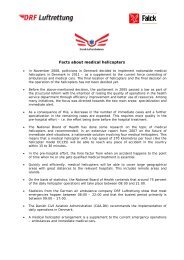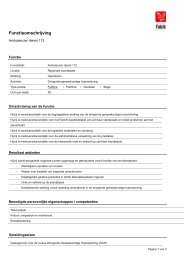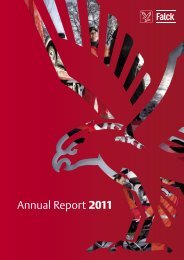Annual Report 2010 - Falck
Annual Report 2010 - Falck
Annual Report 2010 - Falck
You also want an ePaper? Increase the reach of your titles
YUMPU automatically turns print PDFs into web optimized ePapers that Google loves.
40 <strong>Falck</strong> <strong>Annual</strong> <strong>Report</strong> <strong>2010</strong> | Management review<br />
committee for this purpose. In <strong>Falck</strong>, two of the three members<br />
of the Audit Committee represent major shareholders and the<br />
company therefore does not meet the recommendation that a<br />
majority of the members of a management committee should<br />
be independent. However, the Board of Directors has considered<br />
it important that committee members hold the necessary<br />
qualifications in accounting or auditing, whereas the Board of<br />
Directors always has the final responsibility for the decisions<br />
prepared by the Audit Committee.<br />
The rules of procedure provide that our Board of Directors<br />
must ensure that the Board of Directors possesses relevant<br />
and adequate knowledge and skills to manage the company<br />
when nominating candidates to the shareholders at the general<br />
meeting. The Board of Directors aims to nominate candidates<br />
who are 67 years of age as a maximum. Prior to any election of<br />
members of the Board of Directors by the shareholders, candidates’<br />
CVs are disclosed, including information about executive<br />
positions in other companies.<br />
The Board of Directors meets whenever the chairman deems<br />
it necessary or when requested by a member of the Board of<br />
Directors or a member of the Executive Management Board. At<br />
least five meetings of the Board of Directors are held each year.<br />
6. Remuneration of Management<br />
Openness and transparency about all important issues regarding<br />
the principles for and amounts of the total remuneration offered to<br />
members of the governing bodies are essential. The principles of the<br />
remuneration policy should support a long-term value-creation for<br />
the company.<br />
Competitive remuneration is a prerequisite for attracting and<br />
retaining competent members of the governing bodies. The total<br />
remuneration package, i.e. the fixed and variable components and<br />
other remuneration components, should be reasonable and reflect<br />
the governing body members’ independent performance, responsibilities<br />
and value creation in the company. The variable component<br />
of the remuneration should be based on actual achievements over<br />
a period of time with a view to long-term value creation.<br />
<strong>Falck</strong>’s position<br />
<strong>Falck</strong> believes that it complies with the recommendations under<br />
heading 6 in all essentials.<br />
The general principle is for the remuneration of the Board of<br />
Directors in <strong>Falck</strong> to be at a level considered comparable with<br />
companies listed on NASDAQ OMX Copenhagen of a similar size<br />
and internationalisation profile. The company does not use incentive<br />
pay for the Board of Directors. The following guidelines<br />
apply to the fixed remuneration of the Board of Directors:<br />
• The Chairman of the Board receives three times the basic<br />
remuneration<br />
• The Deputy Chairmen of the Board receive twice the basic<br />
remuneration<br />
• The basic remuneration is not subject to any adjustment<br />
mechanisms<br />
• Additional separate remuneration is paid to Board members<br />
who sit on Board committees. However, the total remuneration<br />
for Board work paid to the Chairman and Deputy<br />
Chairman of the Board of Directors and to other members of<br />
the Board of Directors may not exceed four times and twice<br />
the basic remuneration, respectively.<br />
We aim for members of the Executive Management Board to<br />
receive a fixed salary considered competitive relative to, and<br />
comparable with, the salaries paid to the executive boards by<br />
other companies of similar size, and which is reasonable relative<br />
to the tasks performed. The remuneration of the Executive<br />
Management Board is reviewed annually at the initiative of the<br />
Chairman of the Board of Directors. <strong>Falck</strong>’s annual report does<br />
not disclose the remuneration paid to each member of the Executive<br />
Management Board. We believe this would not provide<br />
additional relevant information compared with disclosure of the<br />
total remuneration paid to the Executive Management Board.<br />
Incentive pay in <strong>Falck</strong> serves to better align the interests of our<br />
Executive Management Board and our shareholders. We do this<br />
by motivating the Executive Management Board to achieve the<br />
goals defined for the company, and by making it less attractive<br />
for members of the Executive Management Board to leave the<br />
company prematurely. Incentive pay can also be a useful tool to<br />
attract new Executive Management Board members. Such programmes<br />
may comprise remuneration in the form of options,<br />
warrants, shares and/or bonus agreements.<br />
7. Financial reporting<br />
Each member of the supreme governing body and the executive<br />
board is responsible for preparing the annual report and other
















